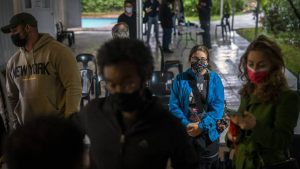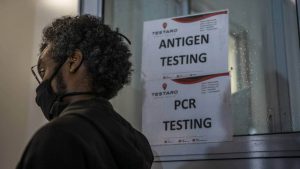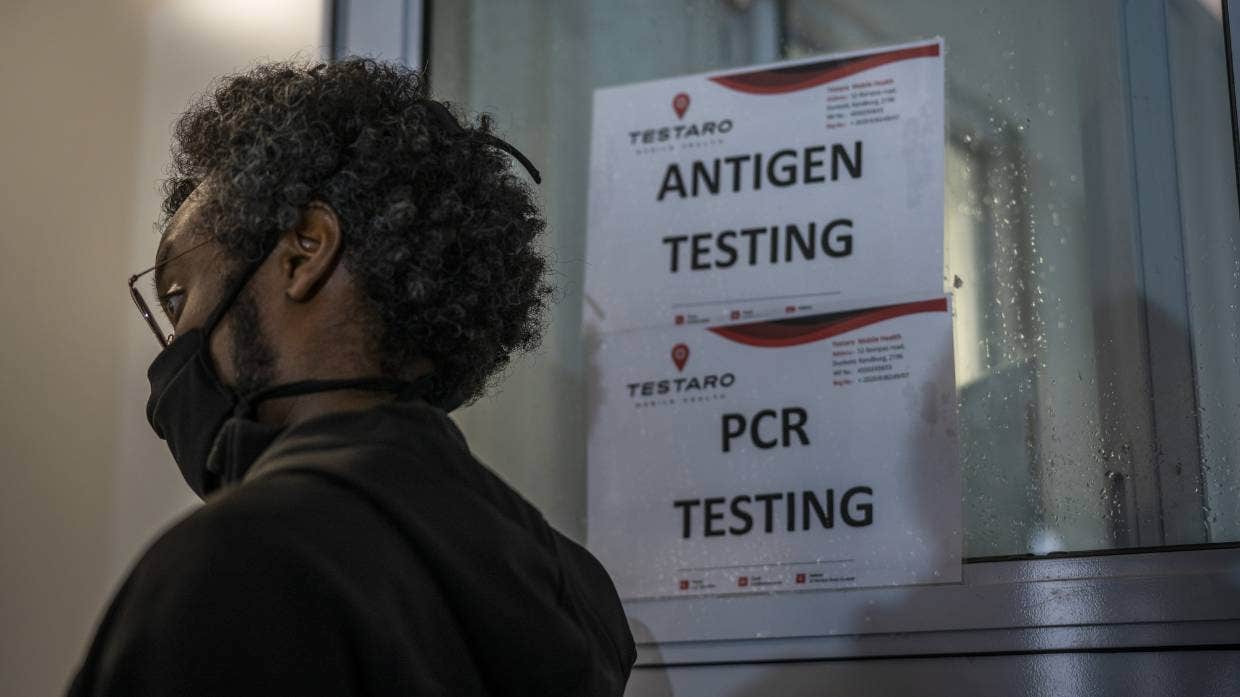第一位向当局通报 Omicron 变体患者的南非医生告诉《每日电讯报》,新变体的症状不寻常但很轻微。
Angelique Coetzee 博士说,当她在首都比勒陀利亚繁忙的私人诊所中的患者本月早些时候开始出现 Covid-19 症状时,她第一次意识到新变异的可能性。
她说,这些病人包括不同背景和种族的年轻人,他们有强烈的疲劳感,还有一个脉搏非常高的6岁儿童。没有人遭受味觉或嗅觉的损失。
Coetzee博士说:”他们的症状与我以前治疗过的症状非常不同,而且非常轻微。”Coetzee博士是一位有33年经验的全科医生,在经营她的诊所的同时,还担任南非医学协会的主席。
11 月 18 日,当四名家庭成员的 Covid-19 检测结果全部呈阳性且都感到自己身体精疲力竭时,她通知了该国的疫苗咨询委员会。
她说,在她的病人中,总共有二十几个人的Covid-19检测结果呈阳性,并有Omicron新变体的症状。他们大多是健康的男性,出现时 “感觉很累”。其中大约一半人没有接种疫苗。

“我们有一个非常有趣的病例,一个孩子,大约6岁,发烧,脉搏很高,我想知道是否应该让她住院。但是,当我两天后随访时,她已经好得多了。”Coetzee医生说。
Coetzee医生在周六向其他非洲医学协会介绍情况时明确表示,她的病人都很健康,她担心新的变体仍然会对老年人,特别是有糖尿病或心脏病等并发症的人,造成更大的打击。

她说:”我们现在要担心的是,当年龄较大、未接种疫苗的人感染了新的变体时,如果他们没有接种疫苗,我们将看到许多患者会呈现出更为严重的疾病表现形式。”
南非的人口结构与英国的人口结构非常不同。只有大约6%的人口年龄超过65岁。这意味着更容易受到病毒影响的老年人可能需要一些时间才能出现。
英国出现两例Omicron病例
B.1.1.529变体,现在被称为Omicron,于11月11日在博茨瓦纳首次被发现。它现在已经在英国以及南非、以色列、荷兰、香港和比利时被发现。
这是迄今为止发现的变异最多的Covid-19形式,穗状蛋白发生了32次变异。科学家们担心,这些突变可能使它能够逃避现有的疫苗并迅速传播。
现在英国已经发现了两例Omicron,埃塞克斯和诺丁汉郡的两个人对这种新的变体检测呈阳性。
英国官员正忙于在测试数据库中寻找Omicron变体的任何进一步迹象,这主要是因为上周六(当地时间)在伦敦西南部的特威克纳姆地区有许多南非人在观看英格兰和南非的比赛。
南非科学家说Omicron是该国豪登省病例爆炸的幕后推手,该省是该国商业首都约翰内斯堡和比勒陀利亚的所在地。病例已从上周的每天约550例飙升至目前的每天近4000例。
英国、美国、欧盟和以色列都暂停了与南非及周边五个国家的往来旅行。博茨瓦纳、埃斯瓦蒂尼、莱索托、莫桑比克、纳米比亚和津巴布韦。英国政府于周日将安哥拉、马拉维、莫桑比克和赞比亚列入了旅行红名单。
{澳纽网编译}
The first South African doctor to alert the authorities about patients with the Omicron variant has told The Telegraph that the symptoms of the new variant are unusual but mild.
Dr Angelique Coetzee said she was first alerted to the possibility of a new variant when patients in her busy private practice in the capital Pretoria started to come in earlier this month with Covid-19 symptoms that did not make immediate sense.
They included young people of different backgrounds and ethnicities with intense fatigue and a six-year-old child with a very high pulse rate, she said. None suffered from a loss of taste or smell.
“Their symptoms were so different and so mild from those I had treated before,” said Dr Coetzee, a GP for 33 years who chairs the South African Medical Association alongside running her practice.
On November 18, when four family members all tested positive for Covid-19 with complete exhaustion, she informed the country’s vaccine advisory committee.
She said, in total, about two dozen of her patients have tested positive for Covid-19 with symptoms of the new variant. They were mostly healthy men who turned up “feeling so tired”. About half of them were unvaccinated.
“We had one very interesting case, a kid, about six years old, with a temperature and a very high pulse rate, and I wondered if I should admit her. But when I followed up two days later, she was so much better,” Dr Coetzee says.
Dr Coetzee, who was briefing other African medical associations on Saturday, made clear her patients were all healthy and she was worried the new variant could still hit older people – with co-morbidities such as diabetes or heart disease – much harder.
“What we have to worry about now is that when older, unvaccinated people are infected with the new variant, and if they are not vaccinated, we are going to see many people with a severe [form of the] disease,” she said.
South African demographics are very different from those in the UK. Only about six per cent of the population are over the age of 65. This means that older individuals who are more vulnerable to the virus may take some time to present.
Two cases of Omicron in UK
The B.1.1.529 variant, now called Omicron, was first identified in Botswana on November 11. It has now been detected in the UK as well as South Africa, Israel, the Netherlands, Hong Kong and Belgium.
It is the most mutated form of Covid-19 discovered thus far, with 32 mutations to the spike protein. Scientists are concerned that the mutations may allow it to evade existing vaccines and spread quickly.
Two cases of Omicron have now been found in the UK, with two people in Essex and Nottinghamshire testing positive for the new variant.
UK officials are busy scouring testing databases for any further sign of the Omicron variant, not least because there were many South Africans in the Twickenham area of south-west London for the England and South Africa match last Saturday (local time).
South African scientists say Omicron is behind an explosion of cases in the country’s Gauteng province, which is home to the country’s commercial capital Johannesburg and Pretoria. Cases have rocketed up from about 550 a day last week to almost 4000 a day currently.
The UK, US, the EU and Israel have all suspended travel to and from South Africa and the five surrounding countries: Botswana, Eswatini, Lesotho, Mozambique, Namibia, and Zimbabwe. The UK Government added Angola, Malawi, Mozambique and Zambia to the travel red list on Sunday.
3,299 views





